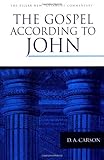
The Pillar New Testament Commentary Series
I have already blogged about the Pillar New Testament Commentary series, which is itself edited by Don Carson, so you can read my general thoughts on the layout and goals of this series there.
The Introduction
The introduction is fairly lengthy (80 pages), and dives straight in with a look at the distinctives of the gospel of John as compared to the Synoptics. Carson has of course also authored a commentary on Matthew that paid special attention to the relationship between the Synoptics, so this enables him to complete the picture.
He devotes several pages to the historical interpretation of John’s gospel, before embarking on a lengthy defence of the authenticity of the fourth Gospel. In particular, he addresses Bultmann’s antisupernaturalism and ‘demythologizing’ of the text. He points out that the Dead Sea scrolls find has removed the need to postulate a hellenistic background to the thought of John’s gospel.
Another sizable section is devoted to authorship, in which he casts doubt on the validity of efforts to detect several sources in the text. He concludes that a working assumption of Johannine authorship is the best way to approach the text. He very tentatively dates it at around AD 80.
Carson even includes some advice for those preaching from the book of John. Overall the introduction is a great read, and almost a book in its own right.
The Commentary
The commentary itself is densely packed in with little whitespace, and no inclusion of the biblical text. There are surprisingly few footnotes, since Carson prefers to do most of his interaction with other commentators in the main text. As with his Matthew commentary, he loves to take the time to defend the text against accusations of fabrication, and offers explanations for supposed problems. He is also quite happy to spend several pages digging deeper into a particular theological concern that is raised by the text.
The commentary itself is far too massive for me to attempt to summarise all the useful points. To list all the sections of John in which I found Carson’s comments particularly helpful I would be to list the entire contents.
Carson’s strengths as a biblical commentator are the comprehensive way he tackles the types of concern that an expositor will have. He incisively gets to the bottom of what the sayings mean, some of which are hard to unpack. He has a good eye for Old Testament allusions. He is willing to take on and reject other possible interpretations, both from skeptics and other Christian traditions (such as Roman Catholicism). He is also prepared to reject “sentimental” conclusions popular amongst evangelicals if the exegesis does not bear it out.
Conclusion
I cannot recommend this commentary on John highly enough. It is a magnificent work, and one that would greatly benefit any serious student or teacher of the Bible. Yes, it is quite long, but it is always interesting. It has actually taken me about five years to work my way through it, but I am glad I have done so, and this will almost certainly be one of the first commentaries I consult every time I am doing study on John.

